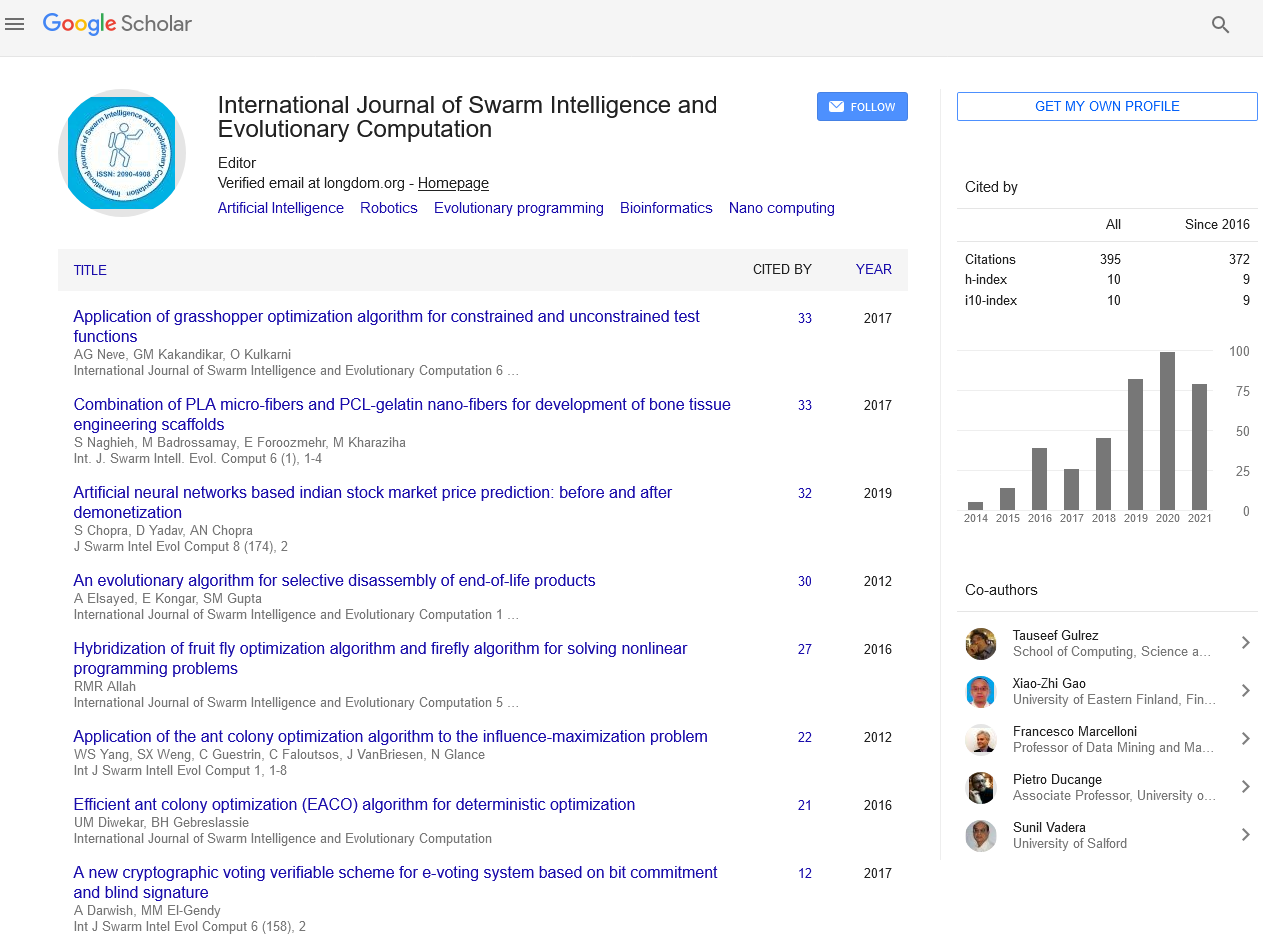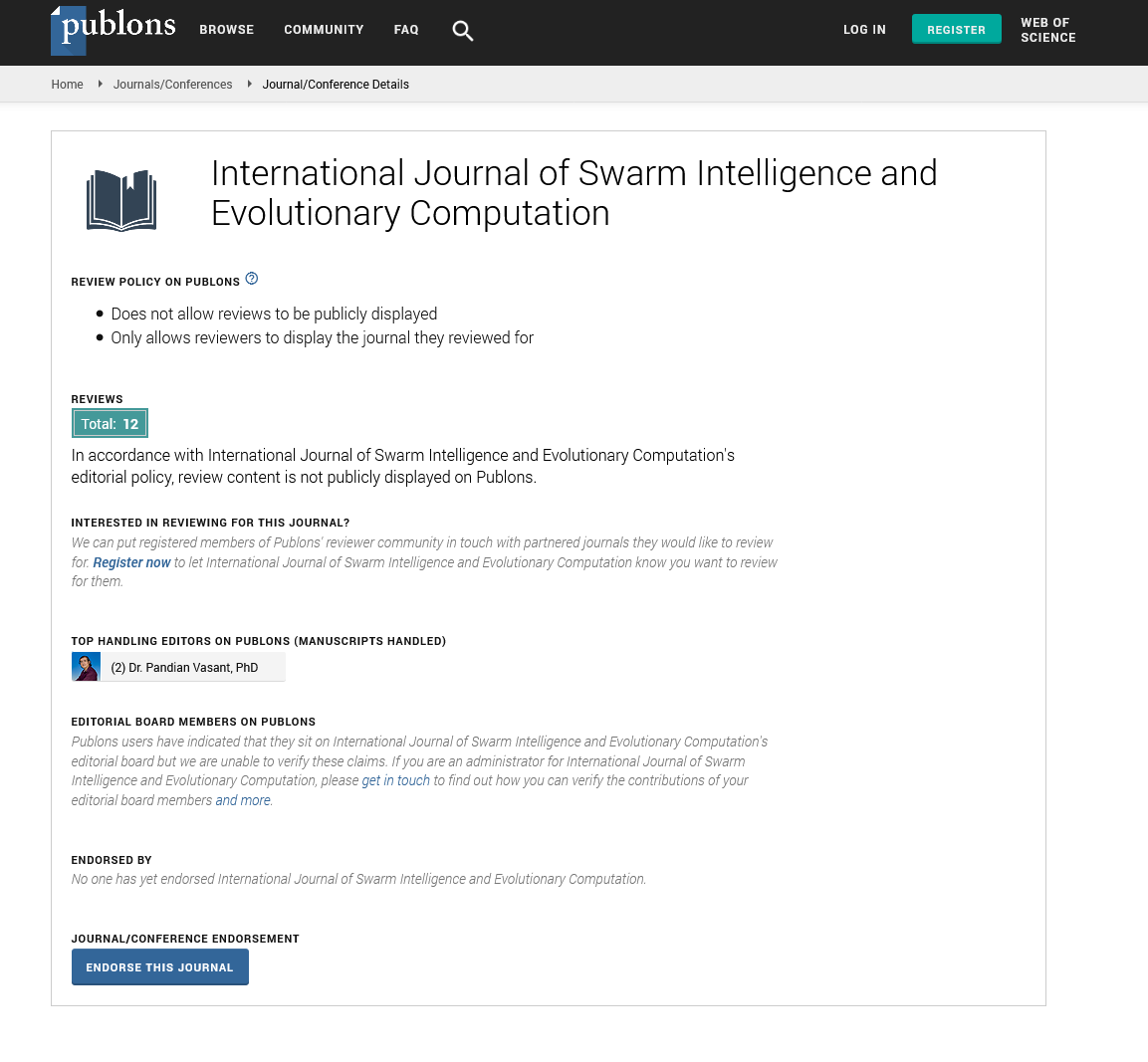Indexed In
- Genamics JournalSeek
- RefSeek
- Hamdard University
- EBSCO A-Z
- OCLC- WorldCat
- Publons
- Euro Pub
- Google Scholar
Useful Links
Share This Page
Journal Flyer

Open Access Journals
- Agri and Aquaculture
- Biochemistry
- Bioinformatics & Systems Biology
- Business & Management
- Chemistry
- Clinical Sciences
- Engineering
- Food & Nutrition
- General Science
- Genetics & Molecular Biology
- Immunology & Microbiology
- Medical Sciences
- Neuroscience & Psychology
- Nursing & Health Care
- Pharmaceutical Sciences
Commentary Article - (2025) Volume 14, Issue 2
Evolving Landscape: Future Trends and Unforeseen Synergies in Swarm Intelligence and Artificial Intelligence
Hiroaki Shimizu*Received: 18-Apr-2025, Manuscript No. SIEC-25-28710; Editor assigned: 21-May-2025, Pre QC No. SIEC-25-28710 (PQ); Reviewed: 05-May-2025, QC No. SIEC-25-28710; Revised: 12-May-2025, Manuscript No. SIEC-25-28710 (R); Published: 19-May-2025, DOI: 10.35248/2090-4908.24.14.427
Description
The fields of Swarm Intelligence and Artificial Intelligence are both rapidly evolving, and the future holds the promise of even more profound synergies and unforeseen advancements at their intersection. Several key trends suggest exciting directions for future research and development in Swarm AI.
One significant trend is the increasing integration of deep learning techniques with swarm-based algorithms. Deep learning's ability to learn complex representations from large datasets could be used to enhance the decision-making capabilities of individual swarm agents, allowing them to operate more effectively in complex and dynamic environments. Conversely, swarm intelligence principles could be applied to optimize the architecture and training of deep learning models, potentially leading to more efficient and robust learning algorithms.
Another promising direction is the development of more sophisticated bio-inspired models that go beyond simple analogies with ant colonies or bee swarms. Researchers are increasingly looking at the collective behaviors of other biological systems, such as bacterial colonies, immune systems, and neural networks, for inspiration in designing novel Swarm AI architectures and algorithms. This could lead to the discovery of new principles of decentralized control, communication, and adaptation that can further enhance the capabilities of artificial intelligent swarms.
Furthermore, the increasing availability of low-cost, small-scale robotic platforms and advancements in areas like micro-robotics and nanotechnology will likely fuel the development of increasingly large and capable physical Swarm AI systems. These systems could have a transformative impact in areas such as precision agriculture, environmental remediation, and even medical applications at the nanoscale.
Finally, addressing the ethical and societal implications of Swarm AI will become increasingly critical as these technologies mature. Future research will need to focus on developing mechanisms for ensuring the safety, transparency, and accountability of Swarm AI systems, as well as fostering public understanding and trust in their deployment. The evolving landscape of Swarm Intelligence and Artificial Intelligence promises a future where intelligent swarms play an increasingly significant role in addressing complex challenges and shaping the world around us, driven by unforeseen synergies and a deeper understanding of the principles of collective intelligence.
A defining trend is the shift from centralized, monolithic AI systems toward decentralized, agent-based frameworks, where multiple simple agents coordinate to perform complex tasks. Swarm Intelligence naturally excels in this domain. Algorithms such as Particle Swarm Optimization (PSO), Ant Colony Optimization (ACO), and Artificial Bee Colony (ABC) already underpin many AI-based solutions in logistics, healthcare, and cybersecurity. Going forward, their adaptability and resilience to dynamic environments make them ideal candidates for powering the next generation of autonomous multi-agent systems, including drone swarms, planetary exploration robots, and self-healing networks.
Conclusion
The synergy between Swarm Intelligence and Artificial Intelligence is evolving from theoretical convergence to practical integration. Future trends highlight a trajectory toward distributed intelligence, adaptive learning, and real-world autonomy paving the way for intelligent systems that are not only powerful but also resilient, cooperative, and self-organizing. As the boundaries between biological inspiration and artificial cognition blur, the full potential of these intertwined paradigms is yet to be realized. In navigating this evolving landscape, embracing the unpredictability of emergent systems may be our greatest asset-and challenge.
Citation: Shimizu H (2025). Evolving Landscape: Future Trends and Unforeseen Synergies in Swarm Intelligence and Artificial Intelligence. Int J Swarm Evol Comput. 14:427.
Copyright: © 2025 Shimizu H. This is an open-access article distributed under the terms of the Creative Commons Attribution License, which permits unrestricted use, distribution and reproduction in any medium, provided the original author and source are credited


